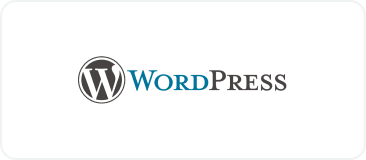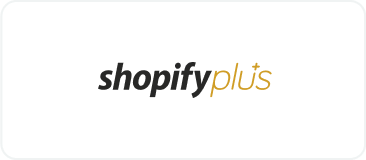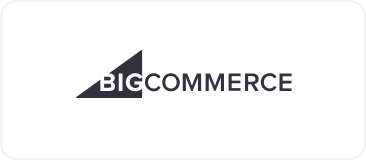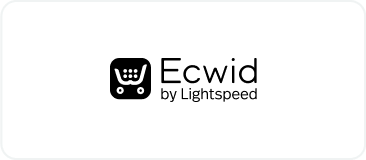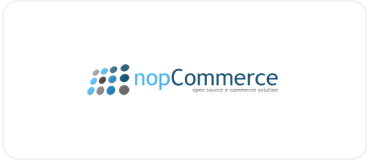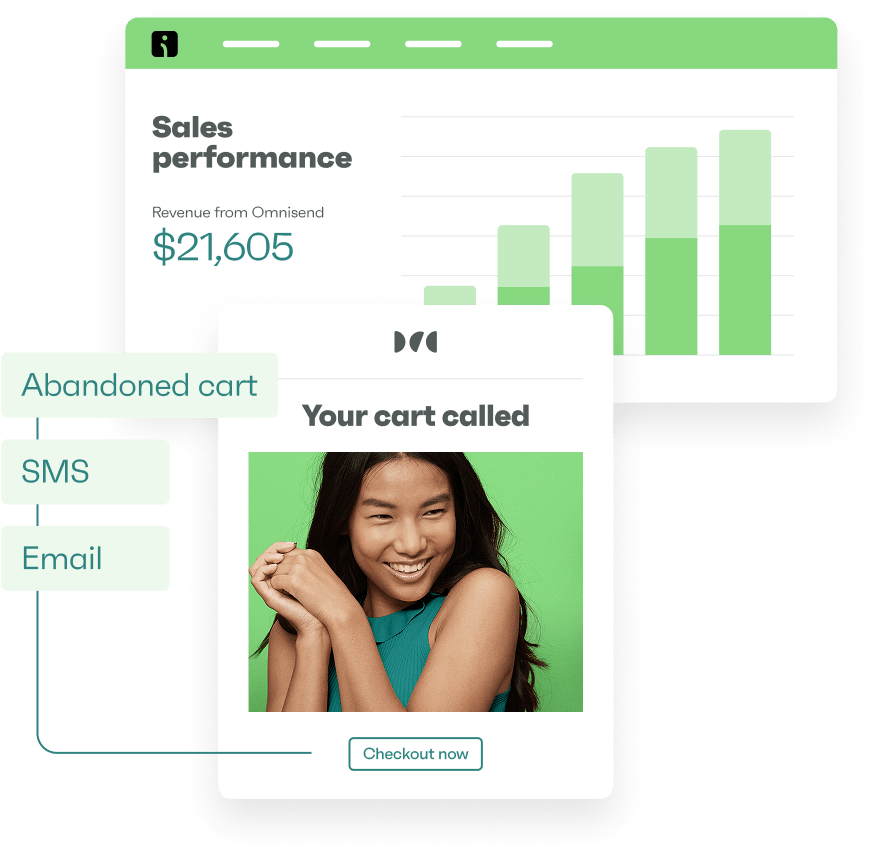Drive sales on autopilot with ecommerce-focused features
See FeaturesRead summarized version with
Artisanal coffee is a trend that’s currently increasing in popularity worldwide, with consumers looking beyond typical high street coffee shops for more unique and varied coffee blends. As a result, Shopify coffee stores are thriving more than ever.
With rising demand for specialty coffee, ethical sourcing, and convenient subscription models, customers prioritize quality and distinctive experiences, creating a real opportunity for entrepreneurs.
Shopify streamlines the process of getting started, making it easy to launch, scale, and customize your online coffee brand. You can dropship, go private label, or sell print-on-demand coffee merchandise. And with built-in SEO features, multiple payment gateways, and mobile optimization, Shopify coffee stores can attract a global audience, maximize conversions, and scale without the usual operational headaches.
This guide outlines the essential steps to launching and marketing a successful Shopify coffee store, covering everything from dropshipping and private label branding to print-on-demand models.
Quick sign up | No credit card required
Why sell coffee online with Shopify?
Owing to the evolving consumer preferences and an increased awareness of high-quality coffee products, the global specialty coffee industry reached $101.6 billion in 2024 and is expected to grow at a CAGR of 10.4% from 2025 to 2030, as per a study by Grandview Research.
The numbers are evident that selling coffee online with Shopify offers a scalable way to tap into the prospering global coffee market. The platform’s intuitive tools allow you to set up a professional store without coding expertise while providing essential features like secure payment processing, automated order fulfillment, and seamless marketing integrations.
Selling beans, cold brew boxes, or subscription blends can all be done via Shopify. What’s more, it supports various business models, including coffee private label dropshipping, where you can sell branded coffee without managing inventory. This reduces upfront costs and enables you to focus on upgrading customer experience and marketing efforts.
The platform’s scalability ensures your business can grow alongside your brand. Success stories for established stores like Death Wish Coffee, which clocked in online sales revenue of $285,899, with a median revenue of $47,138 in February 2025, and Wandering Bear Coffee, with a median revenue of $43,548 and a conversion rate of 7.50–8.00%, are proof of growing coffee businesses on Shopify.
Shopify makes building an ecommerce coffee store efficient, flexible, and capable of being a profitable, sustainable business.
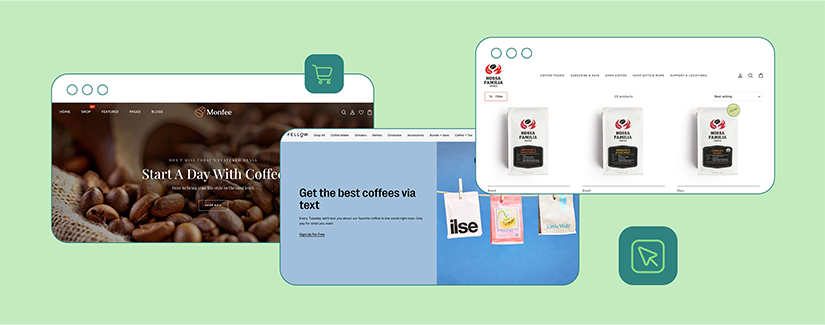
Brewing success with dropshipping
Dropshipping offers entrepreneurs an efficient way to enter the coffee industry without the need to manage inventory. With the growing demand for specialty coffee and consumers seeking unique, high-quality blends, dropshipping allows store owners to meet these needs while concentrating on marketing and customer engagement.
White-label coffee dropshipping is a business model that enables entrepreneurs to sell coffee under their brand without handling production, inventory, or fulfillment. Instead, a third-party supplier roasts, packages, and ships the coffee directly to customers.
Many successful Shopify coffee stores use this model to scale their businesses, focusing on brand development and customer experience while relying on trusted suppliers to manage logistics.
Profitability of dropshipping coffee
Is dropshipping coffee profitable on Shopify? Yes, it can be — with effective strategic planning. Key factors affecting profitability include:
- Healthy profit margins: Typical margins range from 30% to 50%, though they can vary depending on supplier pricing, branding, and shipping costs
- Low startup costs: Unlike traditional coffee businesses, dropshipping requires minimal upfront investment since there’s no need to purchase bulk inventory
- Scalability: Sellers can expand their product offerings by adding specialty blends, organic options, or even coffee-related accessories
- Subscription potential: A coffee subscription model can generate recurring revenue, improving cash flow stability and increasing customer lifetime value
Coffee dropshipping on Shopify offers many advantages, yet it’s not without its challenges. Aspiring store owners should be aware of potential risks that can impact customer experience and long-term success:
- Quality control: Since sellers don’t handle the product directly, ensuring consistent flavor, freshness, and quality across orders can be difficult
- Supplier reliability: Delays or fulfillment issues with suppliers can negatively impact customer satisfaction and harm your brand reputation
- Market competition: The coffee industry is competitive, requiring strong branding and a unique value proposition to differentiate your store
Legal and ethical considerations
Operating a coffee dropshipping business comes with legal and ethical responsibilities. Failing to meet these obligations can lead to customer complaints, legal action, or damage to your brand’s credibility.
On the other hand, staying compliant builds trust with your customers and ensures long-term stability and growth for your Shopify coffee store.
- Food safety regulations: In the US, the FDA regulates coffee sourcing and selling procurement, and sellers may need to comply with labeling and packaging requirements
- Sourcing transparency: Ethical sourcing matters — partnering with suppliers offering fair trade or sustainable coffee builds trust and strengthens your brand
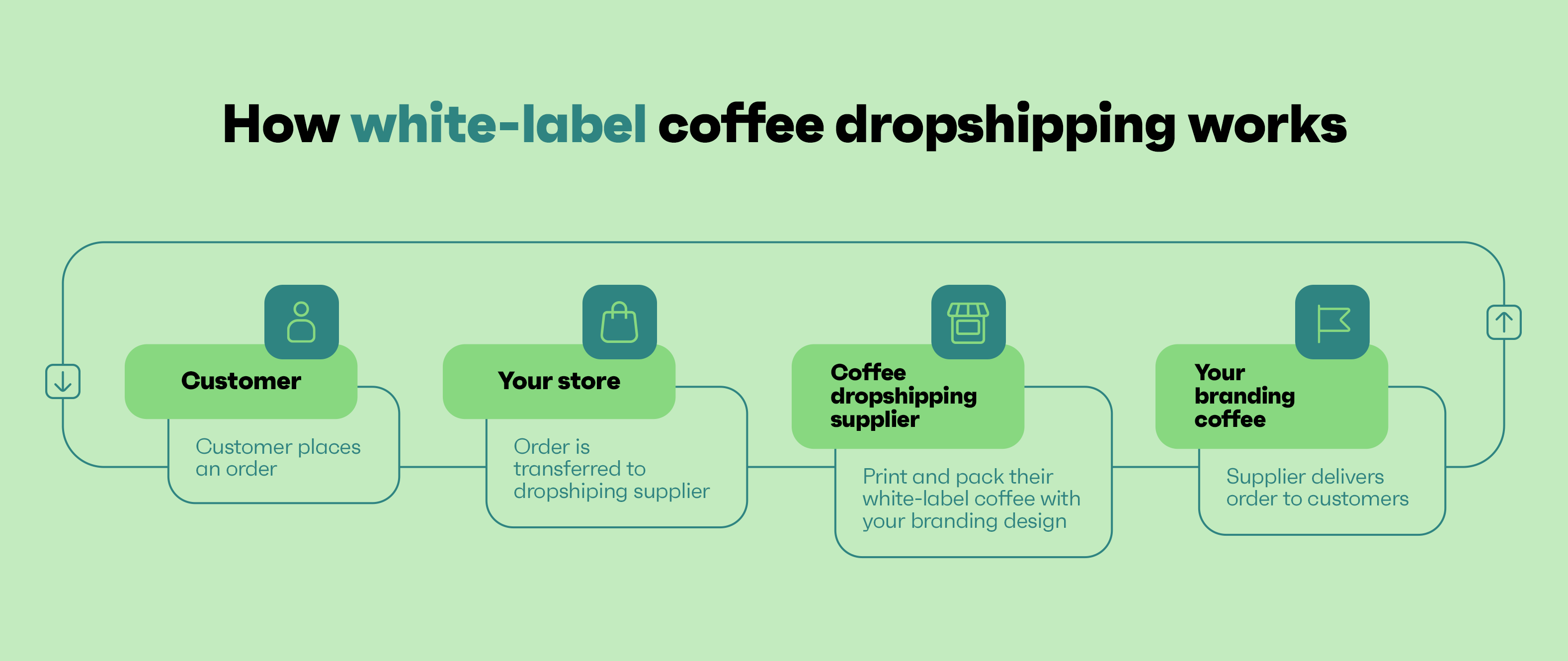
Expert tips for maximizing profitability
To improve success rates and long-term profitability, consider these strategies:
- Choose the right supplier: Work with reputable suppliers that offer high-quality coffee, reliable fulfillment, and customization options for branding
- Optimize branding and packaging: A well-designed brand identity, including custom packaging and storytelling, can set your coffee apart
- Use digital marketing: Invest in SEO, content marketing, and social media ads to drive targeted traffic to your store
- Implement email automation: Tools like Omnisend can help with welcome emails, abandoned cart recovery, and customer retention campaigns to increase conversions
- Test different pricing strategies: Consider bundling products, offering free shipping thresholds, or launching a subscription service to increase revenue
Private label coffee dropshipping: Your brand, your brew
If you’re looking to carve out a unique identity in the online coffee market, private label coffee dropshipping presents an excellent opportunity. It allows entrepreneurs to build a coffee brand from the ground up — without needing to manage production or fulfillment in-house.
Private label coffee dropshipping allows entrepreneurs to sell coffee under their own brand while outsourcing production and fulfillment.
Unlike traditional dropshipping, where sellers rely on generic products, private labeling enables customization — sellers can select coffee blends, design packaging, and build a distinct brand identity.
The main advantage is that customers associate the product with the seller’s brand rather than a supplier, resulting in stronger customer loyalty, higher perceived value, and lasting relationships with your audience.
Over time, customers come to trust both the quality of your coffee and the overall experience your brand provides, including packaging, storytelling, and customer service. This makes them more likely to return and recommend your store.
Here’s an illustration of how the private label coffee dropshipping works:
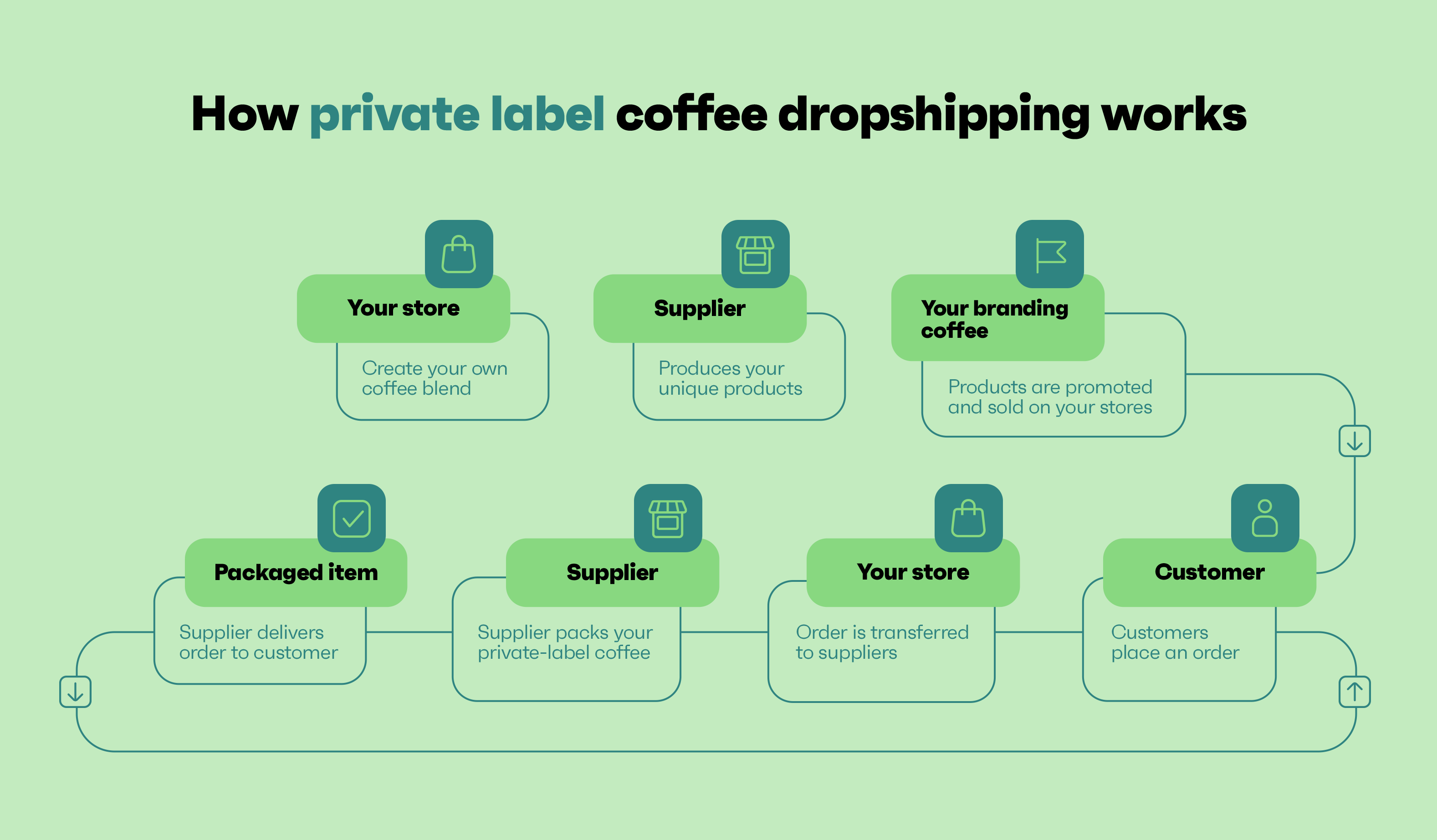
Types of private label coffee dropshipping
There are several private label models, each offering different levels of customization and control. Entrepreneurs can choose the model that best fits their budget, branding goals, and desired level of involvement:
- Roast-to-order: The supplier roasts the coffee after receiving an order, ensuring freshness and quality. This model is ideal for businesses that want to be known for premium, fresh coffee.
- Toll-roasting: Toll-roasting is a custom service where a roasting company processes green coffee beans on behalf of another brand. This model is perfect for sellers who want more control over sourcing and quality, but lack the resources to roast beans themselves.
- Co-packing: The seller manages the entire process, from roasting to packaging, often using pre-selected blends. This model offers less control over sourcing but allows for faster market entry and scalable production.
Choosing a private label coffee dropshipping supplier
Selecting the right supplier is crucial for ensuring product quality and reliable fulfillment. Keep these factors in mind:
- Reputation and reviews: Look for suppliers with strong customer feedback and a track record of quality service
- Customization options: Ensure the supplier allows branding flexibility, including custom packaging, labels, and blend selection
- Sourcing transparency: Consumers increasingly prefer ethically sourced coffee, so verify if the supplier provides information about bean origin and sustainability practices
- MOQ (minimum order quantity): Some suppliers require a minimum order, while others offer flexible, low-order options, which can be beneficial for startups
- Fulfillment speed: Fast shipping times are essential for customer satisfaction, so confirm how quickly orders are processed and delivered
- Customer support: Reliable communication with your supplier is key to resolving issues quickly and maintaining smooth operations
Print-on-demand coffee: Expanding your product line
As your coffee brand grows, offering more than just beans can help you stand out among competitors and create long-lasting connections with your audience. Introducing custom products, such as mugs, t-shirts, or other merchandise, gives your customers additional ways to engage with your brand.
Print-on-demand (POD) is a business model that allows sellers to create and sell custom coffee-related merchandise without holding inventory.
When a customer places an order, the supplier prints the design on the selected product and ships it directly to the buyer. This model enables Shopify coffee store owners to expand their product line without upfront investment in stock.
Benefits of print-on-demand
- Low upfront costs: No need to purchase or store inventory, reducing financial risk
- Brand diversification: Allows coffee entrepreneurs to sell more than just coffee, strengthening brand identity
- Customization: Businesses can offer unique, branded designs on products, creating a loyal customer base
- Easy integration: Many POD services integrate seamlessly with Shopify, automating order fulfillment
Challenges of print-on-demand
- Lower profit margins: Each product is produced individually, making costs higher than bulk manufacturing
- Limited quality control: Since sellers do not handle products directly, ensuring consistent quality depends on the supplier
- Longer fulfillment times: Print-on-demand items often take longer to produce and ship than pre-made inventory
Popular print-on-demand coffee products and suppliers
Shopify coffee store owners can use print-on-demand services to sell a variety of branded merchandise. These products create additional revenue streams and strengthen brand identity while building customer loyalty. Some popular POD items include:
- Mugs: Custom coffee mugs with unique designs, quotes, or branding
- T-shirts and hoodies: Apparel featuring coffee-related slogans or store logos
- Tote bags: Reusable bags with custom coffee-themed prints
- Posters and wall art: Coffee-inspired designs for home and office decor

Some of the top print-on-demand suppliers include Printful, Spreadshirt, and All Over Print Plus.
Printful is known for its high-quality printing on a wide range of products and offers seamless integration with Shopify, making it a popular choice for ecommerce businesses.
Spreadshirt print-on-demand stands out with its fast fulfillment and competitive pricing, especially for apparel and accessories.
Meanwhile, All Over Print Plus specializes in all-over printing, catering to brands looking for unique and eye-catching designs that cover the entire cloth.
Setting up your Shopify coffee store
Launching a Shopify coffee store requires careful planning to ensure a seamless, user-friendly shopping experience. Here’s a step-by-step guide to help you set up your store effectively:
1. Choose a Shopify plan and customize your store
Shopify provides simple customization options that allow you to set up a visually appealing and professional storefront. Here’s how you can make it happen:
- Sign up for Shopify and select a plan — Basic, Shopify, or Advanced — that best fits your budget and business goals
- Choose a Shopify theme that fits your brand — many are tailored for food and beverage stores and can be easily customized
- Personalize colors, fonts, and layouts to create a visually appealing, professional storefront
2. Create well-structured product pages
A strong product page improves customer engagement and conversions. Ensure these elements are included:
- The roast, flavor, origin, and grind options of your coffee
- Coffee beans, packaging, and accessories from multiple angles
- Choice of grind type, bag size, and subscription plans
- Customer reviews, sustainability certifications, and freshness guarantees
3. Set up shipping and payment options
Building trust with your customers starts with offering clear and reliable shipping and payment options. Here’s how you can build trust with payments and shipping:
- Define shipping rates (flat-rate, free shipping thresholds, or real-time carrier rates)
- Offer multiple payment methods, including Shopify Payments, PayPal, and credit/debit cards
- Display secure checkout badges and refund policies to reassure customers
4. Optimize for mobile and SEO
A well-designed Shopify coffee store with an intuitive layout, clear product pages, and convenient checkout encourages customer trust and maximizes conversions.
- Ensure your store is mobile-responsive for a smooth experience on all devices
- Use SEO-friendly product titles and descriptions to improve search engine rankings
- Create a blog section with coffee-related content to attract organic traffic
Omnisend: Your coffee store’s marketing secret weapon
Omnisend is a powerful yet intuitive email and SMS automation platform designed to help ecommerce stores attract, engage, and retain customers.
With features like email automation, SMS marketing, and customer segmentation, Omnisend empowers coffee entrepreneurs to engage customers consistently and expand their businesses with reduced manual effort.
It streamlines key marketing tasks through automation, saving time and improving customer interactions by offering:
- Welcome email series: Make a strong first impression by automatically sending new subscribers personalized coffee recommendations, exclusive offers, or a discount on their first order
- Abandoned cart recovery: Recover lost sales by sending automated reminders to customers who leave items in their cart without completing their purchase
- Customer segmentation: Tailor promotions based on customer preferences, such as targeting espresso enthusiasts or cold brew lovers with relevant offers
- Loyalty and rewards programs: Encourage repeat business by offering exclusive deals and discounts to returning customers
- Upselling and cross-selling: Increase order value by recommending coffee accessories, subscriptions, or complementary blends based on past purchases
- SMS marketing for urgent promotions: Send real-time newsletters for limited-time deals, restocks, or personalized order updates
Here’s an example of a pre-built email template specially made for coffee ecommerce stores by Omnisend:
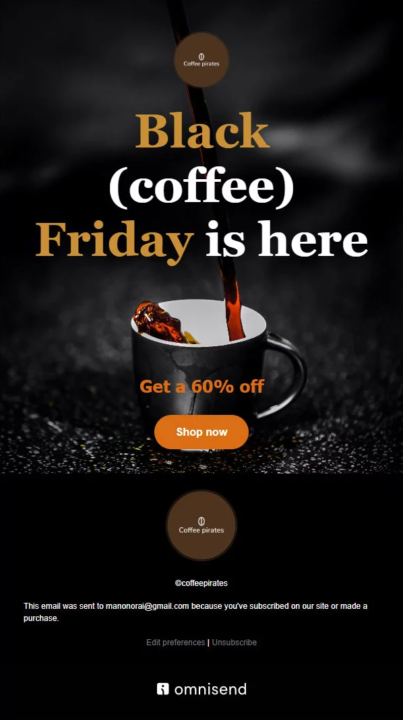
Omnisend offers practical and effective ways to engage customers and drive sales. For instance, you can promote new blends through email campaigns paired with automated follow-up SMS messages.
Trigger-based workflows can bring in sales during the slower seasons, though automated promotional emails and coupon codes can be used to offer timely discounts.
You can also send brewing tips, coffee recipes, and expert advice, helping to build trust and establish your brand as a go-to source for all things coffee. Additionally, you can set up reminders for subscriptions or promote premium upgrades.
From roasting in small batches to scaling globally, Omnisend helps you stay connected with your customers and grow your Shopify coffee business efficiently.
Success story: How Omnisend increased To’ak Chocolate’s sales
Omnisend has helped brands like To’ak Chocolate scale its ecommerce sales through automation, personalized email marketing, and customer engagement. Using Omnisend’s advanced features, To’ak Chocolate improved its email open rates by 39% and grew revenue from automated campaigns.
Read the full success story of To’ak Chocolate here.
Quick sign up | No credit card required
Shopify coffee stores FAQs
Yes, Shopify is an excellent platform for selling coffee online. It offers easy-to-use tools for setting up an ecommerce store, managing inventory, and processing payments. Shopify provides integrations for marketing, shipping, and customer engagement.
If you’re selling roasted coffee beans, FDA approval isn’t required, but you must follow food labeling and packaging regulations. However, if you add nutritional claims, supplements, or ready-to-drink coffee, additional FDA compliance may be necessary. Always check state and federal guidelines before launching your store.
Shopify does not provide a public directory of stores, but you can find coffee businesses using Shopify by checking marketplaces, case studies, and online tools like myip.ms. You can also look for Shopify-powered coffee brands through social media, Google searches, and Shopify’s own success stories.
Yes, coffee dropshipping can be profitable, especially with private label branding. Success depends on choosing high-quality suppliers, strong branding, and effective marketing strategies like subscription models or niche targeting (e.g., organic or ethically sourced coffee).
You don’t legally need an LLC to start selling coffee, but forming one helps protect your personal assets and establishes credibility. Many entrepreneurs start as sole proprietors and transition to LLCs as they scale. Check state requirements and consult a legal expert for the best structure for your business.
TABLE OF CONTENTS
TABLE OF CONTENTS


No fluff, no spam, no corporate filler. Just a friendly letter, twice a month.
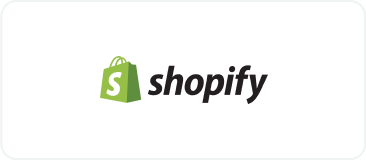
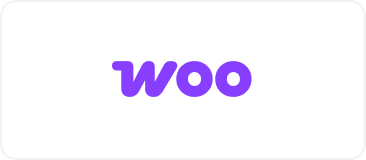 OFFER
OFFER
